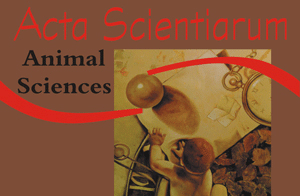ABSTRACT.
Agroindustrial co-products are a viable alternative for use in animal nutrition. Tests were conducted using eight different types of co-products and feed to evaluate the chemical composition, in vitro digestibility of dry matter, crude protein and neutral detergent fiber, and gas production by them. The co-products tested were: coffee hulls; pelleted citrus pulp; grape residue; soybean hulls; cottonseed; cassava foliage; and foods usually supplied to ruminants: corn silage and ground corn concentrate. Data of in vitro digestibility of dry matter, crude protein and neutral detergent fiber were tested by analysis of variance using the least square method; the results of gas production were interpreted by a non-linear regression by the Gauss-Newton method; and the effects of treatments were evaluated by the Tukey’s test. The coefficients of in vitro digestibility of dry matter, crude protein and neutral detergent fiber of co-products were different. Gas production was also different between co-products and feeds evaluated for the volume of gas produced from the fast and slow degradation fractions, degradation rate, bacterial colonization time, and the total volume of gas produced. The evaluated co-products exhibited greater in vitro dry matter digestibility compared to corn silage, except for cottonseed, grape residue, and cassava foliage. Co-products showed higher values of in vitro crude protein digestibility compared to corn silage, and a reduced in vitro digestibility of neutral detergent fiber, except for pelleted citrus pulp and soybean hulls. Corn silage produced larger volume of gas from the fast degradation fraction compared to the co-products and corn concentrate. Co-products analyzed had appropriate nutritional characteristics according to the techniques applied and can be included in ruminant diets.
Keywords:
alternative feed; degradation; fermentation; gas production
